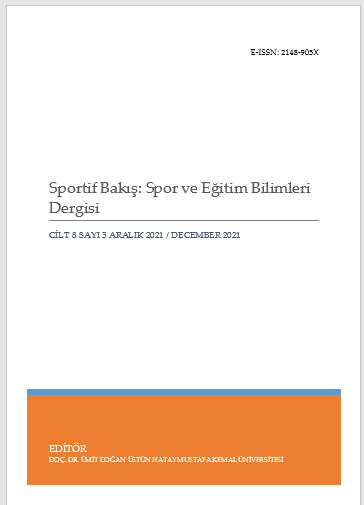Genç Futbolcularda Antrenör-Sporcu İlişkisinin Ahlaki Karar Alma Tutumları ile Prososyal ve Antisosyal Davranışlarla İlişkisi
The Relationship of the Coach-Athlete Relationship with the Moral Decision-Making Attitudes and Prosocial and Antisocial Behaviors in Young Football Players
Author(s): Selman Orhan, Melih Nuri SalmanSubject(s): Ethics / Practical Philosophy, Behaviorism, Sports Studies
Published by: Dumlupınar Üniversitesi - Beden Eğitimi ve Spor Yüksekokulu
Keywords: Coach; athlete; behavior; moral decision-making attitude; prosocial and antisocial behavior;
Summary/Abstract: A number of factors such as family, audience, manager and competition environment influence prosocial and antisocial behaviors and moral decision-making attitudes in sports. In this context, the aim of the study was to investigate the relationship and effect of the coach-athlete relation on moral decision-making attitudes and prosocial and antisocial behaviors. Correlational survey model was adopted in this study. The sample of the study consisted of 246 licensed male football players, who were between 14-17 years old, in Elazığ, Bolu, Ankara and Gaziantep in the 2019-2020 season. The average age of the players was M=15.17±0.7. Four scales were used to collect data: “Personal Information Form”, “Attitudes to Moral Decision-making in Youth Sport Questionnaire 2”, “Interpersonal Behaviors Questionnaire in Sport” and “Prosocial and Antisocial Behavior in Sports Scale”. Descriptive statistics, Pearson correlation coefficient and multiple regression analysis were used in data analysis. Autonomysupportive in interpersonal behaviors in sports, keeping winning in proportion in moral decisionmaking attitudes, and prosocial behavior of teammate in prosocial and antisocial behaviors were found to have higher mean scores compared to other sub-scales. In addition, a positive significant relationship between interpersonal behavior in sports, moral decision-making attitude and prosocial and antisocial behaviors in sports and the age variable was found. Interpersonal behavior in sports explained 68% of the total variance in prosocial behavior as well as 45% of the total variance in antisocial behavior. Finally, it was found that interpersonal behavior in sports explained 3% of the total variance at the level of keeping winning in proportion in moral decision-making attitudes. As a result, ıt was concluded that the relationship and effect of the coach-athlete relationship on moral decision-making attitudes and prosocial and antisocial behaviors in young football players was statistically significant.
Journal: Sportif Bakış: Spor ve Eğitim Bilimleri Dergisi
- Issue Year: 8/2021
- Issue No: 3
- Page Range: 334-355
- Page Count: 22
- Language: Turkish

